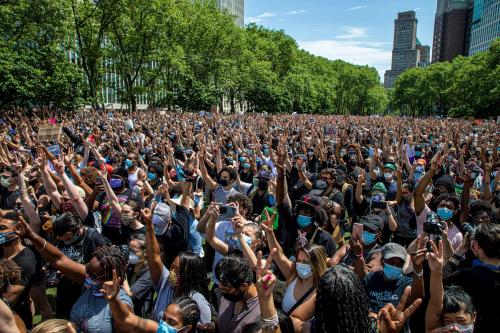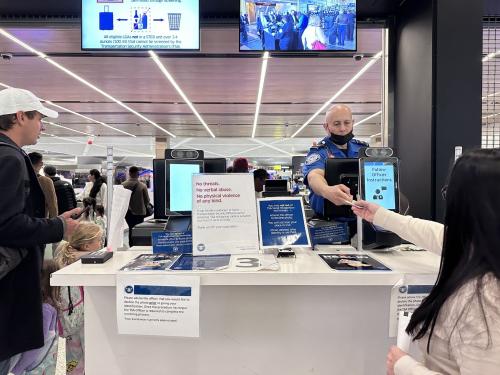Democracy is under attack in the United States and around the world. For example, recent elections in France, Germany, the Netherlands, and Italy featured far-right candidates with explicitly nationalist agendas, and many of their parties gained record numbers of seats in their respective parliaments. The Brexit vote in the United Kingdom meanwhile signaled a desire among some voters to elevate domestic interests over global ones. Nations such as Turkey, the Philippines, Poland, and Hungary have eroded basic civil liberties and shifted toward more authoritarian rule.
In the United States, there also are significant challenges facing democracy. Critics complain that President Donald Trump has eroded democracy by violating norms of civility and undermining news organizations by accusing them of being purveyors of “fake news.” Yale Law Professor Amy Chua has noted the rise of political tribalism that pits group against group and erodes common bonds.1 Brookings scholar William Galston has analyzed populist threats to democracy based on economic anxiety and cultural divisions.2 Harvard Professor Yascha Mounk talks about the dangers that arise when social media divide people and large moneyed interests gain disproportionate influence over the political process.3 And in the most chilling interpretation, professors Steven Levitsky and Daniel Ziblatt have a book describing how democracies can die a slow death through weak institutions and voter mistrust.4
In this paper, we look at views of U.S. democracy using internet search data. We examine public interest in democracy, fake news, money in politics, ethics concerns, the rule of law, and major political institutions in order to gauge how Americans are reacting to recent developments. This report is the second in a series of big data analysis that charts long-term trends in online search activity. Our first report focused on views about Donald Trump in his first year as president.5
The current analysis reveals several important results on views about American democracy:
- Searches for democracy fluctuated throughout the Trump administration, but were especially high around the Charlottesville, Va., protests and the chief executive’s false equivalence of college protesters and white supremacists.
- Trump’s accusations that news media are reporting inaccurate stories about him drove many searches for fake news, culminating in a peak around his “Fake News Awards” given out in January 2018.
- Money and politics is a recurring concern in American democracy, and our analysis found that interest in billionaires peaked around the release of the “Paradise Papers” documenting the offshore financial holdings of wealthy individuals and high income concentration in the United States.
- Ethical concerns drove public interest in emoluments, presidential conflicts of interest, and Special Counsel Robert Mueller’s investigation into Trump conduct.
- Searches for rule of law, accountability, and conflict of interest reached high points when Trump flouted norms of presidential behavior, such as in the cases of his firing FBI Director James Comey and pardoning the controversial Arizona sheriff, Joe Arpaio.
- Searches for president, Congress, and the Supreme Court dovetailed with Trump’s inauguration address and with special elections.
Internet search queries
Digital media platforms represent a lens through which to study contemporary politics. Tools like Google and Bing searches, Facebook posts, Twitter tweets, and Instagram sharing reveal important clues about what is happening today. For example, the topics on which people search show what is of interest to them and how that interest changes over time. Facebook likes and sharing behavior help people understand how others engage with important topics and how those reactions change over time. People’s reactions to tweets in terms of retweets and likes represent a form of engagement that measure type and intensity of reaction. Instagram sharing behavior reveals what people like and what images engage them.
In this analysis, we use Google search queries and event histories to examine trends in views about American democracy during the first 14 months of the Trump presidency.
The analysis of Google search trends has increased in recent years. Seth Stephens-Davidowitz used Google search trends to investigate how much racial animus cost Barack Obama in terms of votes during the 2008 and 2012 elections.6 Google search trends were especially useful in that study as traditional survey results asking white individuals whether they would vote for a black president may have masked an actual reluctance to do so.
Google search data also have been used to examine the agenda setting effects of television and newspaper coverage. Brian Weeks and Brian Southwell studied news coverage of the rumor that Obama was secretly a Muslim.7 By examining search trends prior to 2007, they demonstrated that the volume of news coverage of this rumor positively predicted aggregate Google searches of that idea.
Event histories
Event histories help to make sense of longitudinal data. Matching events that correspond to spikes in interest enable researchers to add context to the aggregate information. For example, developments such as a terrorist attack or a major legislative action often drive media and public interest in particular topics. The media report on high-profile activities and the public responds by requesting information related to those events. Seeing the ups and downs in search behavior and matching those data points to actual events provides clues regarding the factors driving public interest.
From the standpoint of democratic institutions, the past 14 months were quite eventful. Trump was inaugurated on Jan. 20, 2017, followed by a historic women’s march the next day that attracted millions of participants around the world. Trump attracted considerable criticism when his travel ban for seven predominantly Muslim countries was temporarily blocked on Feb. 3. FBI Director James Comey was fired on May 9, which generated concern about obstructionist presidential behavior. Social commentators worried about the fabric of American society when a driver drove his vehicle into a group of street protesters in Charlottesville, Va., on Aug. 17. Former Trump campaign manager Paul Manafort was indicted on federal charges on Oct. 30 and former Trump national security adviser Michael Flynn pled guilty to charges on Dec. 3, thereby raising questions about ethical standards within the Trump circle.
In January 2018, Michael Wolff’s book “Fire and Fury” detailed turmoil within the White House. The day after the book’s publication, Trump declared that “there’s been absolutely no collusion” between his staff and Russia. That same month, the president also referred to Haiti and several African nations as “sh–hole countries” during negotiations with senators over immigration. On Jan. 25, The New York Times reported that Donald Trump had wished to fire Robert Mueller in June 2017 and backed away from the idea only after White house Counsel Donald McGahn threatened to resign.
Methods
In this analysis, we use Google search queries and event histories to examine trends in views about American democracy during the first 14 months of the Trump presidency. The data come from Google searches of the U.S. web between Jan. 1, 2017 and March 3, 2018, and we use weekly search data to smooth the data into regular time intervals.
There were a number of major spikes in public interest in democracy based on developments during the first year-plus of the Trump presidency. As an illustration, there were significant shifts in searches about democracy, fake news, money in politics, ethics, the rule of law, and political institutions.
The topics analyzed include interest in democracy, accountability, and rule of law; political institutions like the presidency, Congress, and the Supreme Court; fake news; ethics topics such as emoluments, Robert Mueller, and conflict of interest; and the role of wealth in American politics. According to Google Trends, interest is defined as “search interest relative to the highest point on the chart for the given region and time. A value of 100 is the peak popularity for the term. A value of 50 means that the term is half as popular. Likewise a score of 0 means the term was less than one percent as popular as the peak.”8
We focus on Google search because it includes 88 percent of the searches that take place in the United States, compared to 7 percent for Bing and 4 percent for Yahoo.9 It is important to note that since data are aggregated, it is not possible to break them down by age, gender, race, or other categories of possible interest. According to Google, its search data are normalized in order to facilitate comparability based on subject, time period, and location.
For a given search term, Google Trends data note that its information represents “an unbiased sample of Google search data. Only a percentage of searches are used to compile Trends data.” Our data was collected on March 8, 2018, which means that trend data analyzed at other points in time could yield different results.
Views about US democracy

One of the highest peaks in interest about democracy occurred in the spring of 2017 when Trump launched a missile strike targeting Syrian airfields in retaliation for chemical weapons attacks on civilians. Since the strikes received no prior authorization from Congress, they generated concern about representative government and institutional checks and balances.
In addition, there was concern about societal divisions and freedom of expression in August 2017 when a car plowed through a protest march in Charlottesville, Va., and killed an innocent demonstrator. Trump generated a major backlash and concern about basic rights when he seemingly equated the rights of white supremacists with those protesting against displays of white supremacy. A number of observers felt he was fueling racial hatred by not condemning racial bigotry.

Accusations of “fake news” have been a consistent theme of the Trump administration, and there were several moments that prompted sharp increases in searches for the term. For example, there were spikes when Trump denounced a CNN reporter for spreading “fake news” at a January 2017 press conference. In June of that year, CNN retracted a story about Anthony Scaramucci, which drew further criticism from the White House and led to increased searches about fake news. Finally, Trump’s “Fake News Awards,” given out to media organizations deemed by the president to report incorrect information about him and his administration, led to a search uptick in January of 2018.

Concern over money in politics has been prevalent for many years. To see how that issue played out in Trump’s first year, we examined searches for billionaires. We found that searches for that term peaked at the same time as the release of the “Paradise Papers,” a secret trove of documents that detailed the offshore financial holdings of wealthy individuals around the world. The quantity of released documents was second only to the Panama Papers, released in 2016, which covered similar financial data. A study released that same week discovered that the three wealthiest Americans collectively hold as much wealth as the bottom 50 percent.

Ethics concerns have been prevalent throughout Trump’s first year in office. Searches for Robert Mueller peaked when Deputy Attorney General Rod Rosenstein appointed him as special counsel for the Department of Justice. Searches for “conflicts of interest” reached their highest level after Donald Trump was inaugurated and commentators criticized Trump for not separating his business interests from his political office. Search interest peaked again after congressional Republicans accused Robert Mueller of having a conflict of interest for serving as FBI director when the Obama administration approved the sale of Uranium One to a Russian company in 2010.

Concern about democracy also was expressed following a series of controversial Trump moves. For example, searches for accountability spiked upward when President Trump dismissed FBI Director James Comey and implied he might have conversation tapes, before eventually admitting he had no recordings. The same thing occurred when the #MeToo movement sought to hold men in positions of power accountable for sexual misconduct.
At other times, there were increases in searches about the rule of law. That happened when a federal judge overturned the first version of Trump’s travel ban in February, and again when the president pardoned former Maricopa County, Ariz., Sheriff Joe Arpaio, who was charged with contempt of court for detaining persons without cause. It came up again as a theme around the time of President Trump’s 2018 State of the Union address.

Searches for Congress increased in the lead up to the special election in Alabama to fill the Senate seat vacated by Jeff Sessions when he joined Trump’s cabinet as Attorney General. Searches for the term president reached a peak around inauguration, and then again a year later, around the time when the Michael Wolff book “Fire and Fury” was published and Trump made remarks describing African countries and Haiti as “sh–hole countries.” Meanwhile, searches for the Supreme Court reached peaks around the nomination of Justice Neil Gorsuch and at the closing of their term, when the court upheld the president’s partial travel ban.
Conclusion
To summarize, there were a number of major spikes in public interest in democracy based on developments during the first year-plus of the Trump presidency. As an illustration, there were significant shifts in searches about democracy, fake news, money in politics, ethics, the rule of law, and political institutions. When President Trump flouted norms of presidential behavior, made provocative statements, or enacted controversial policy proposals, it generated public interest.
The concerns displayed about key principles of American democracy demonstrate it is important to be vigilant about the continuing health of the system. In a number of respects, Americans are worried about societal divisions, political polarization, and widespread public mistrust in the U.S. political system.
The concerns displayed about key principles of American democracy demonstrate it is important to be vigilant about the continuing health of the system. Americans are worried about societal divisions, political polarization, and widespread public mistrust in the U.S. political system.
But the good news is that recent polling from the bipartisan Voter Study Group suggests Americans have not lost faith in democracy. As our Brookings colleague William Galston explains, “Since 2014, the share of Americans who say that it is very important to live in a democracy has increased from 73 percent to 83 percent. … Only a minority of those who don’t think democracy is a good form of government are willing to endorse authoritarian alternatives.”10
However, the bad news is that support for democracy is weakest among less educated and less politically engaged individuals. That shows how the current populist backlash against major institutions has opened a schism in American society. Those who are not well educated or engaged in politics are the ones most likely to doubt that democracy is a good form of government and are most open to authoritarian systems.
It is important, of course, to keep in mind the limits of internet search data. First, they are highly aggregated and it is not possible to break down the overall numbers by age, gender, race, or other important demographic categories. Second, they measure interest in a topic, but not the direction of sentiment. Third, search data are sensitive to the terms being queried.
Those points notwithstanding, though, internet search data rest on trillions of data points, provide information in real time, and measure trends over time. That helps analysts explore important topics such as views of democracy during the beginning of Trump’s presidency, and discern shifts in interest based on subject and time. As such, they represent a valuable technique for the exploration of contemporary politics.
-
Footnotes
- Chua, Amy. 2018. Political Tribes: Group Instinct and the Fate of Nations. New York: Penguin Press.
- Galston, William A. 2018. Anti-Pluralism: The Populist Threat to Liberal Democracy. New York & London: Yale University Press.
- Mounk, Yascha. 2018. The People vs. Democracy: Why Our Freedom Is in Danger and How to Save It. Cambridge, MA and London: Harvard University Press.
- Levitsky, Steven, and Daniel Ziblatt. 2018. How Democracies Die. New York: Crown.
- West, Darrell M. 2018. “What Internet Search Data Reveals about Donald Trump’s First Year in Office.” Brookings (blog). January 17, 2018. https://www.brookings.edu/research/what-internet-search-data-reveal-about-donald-trumps-first-year-in-office/.
- Stephens-Davidowitz, Seth. 2014. “The Cost of Racial Animus on a Black Candidate: Evidence Using Google Search Data.” Journal of Public Economics 118 (October): 26–40. https://doi.org/10.1016/j.jpubeco.2014.04.010.
- Weeks, Brian, and Brian Southwell. 2010. “The Symbiosis of News Coverage and Aggregate Online Search Behavior: Obama, Rumors, and Presidential Politics.” Mass Communication and Society 13 (4): 341–60. https://doi.org/10.1080/15205430903470532.
- The definition of “interest over time” is shown at https://trends.google.com.
- Stats Counter, “Search Engine Market Share in the United States,” 2017, http://gs.statcounter.com/search-engine-market-share/all/united-states-of-america.
- Galston, William A. 2018. “Is Public Sentiment Shifting toward Support of Authoritarianism? Not Really.” Brookings (blog). March 13, 2018. https://www.brookings.edu/blog/fixgov/2018/03/13/is-public-sentiment-shifting-toward-support-of-authoritarianism-not-really/.
The Brookings Institution is committed to quality, independence, and impact.
We are supported by a diverse array of funders. In line with our values and policies, each Brookings publication represents the sole views of its author(s).





